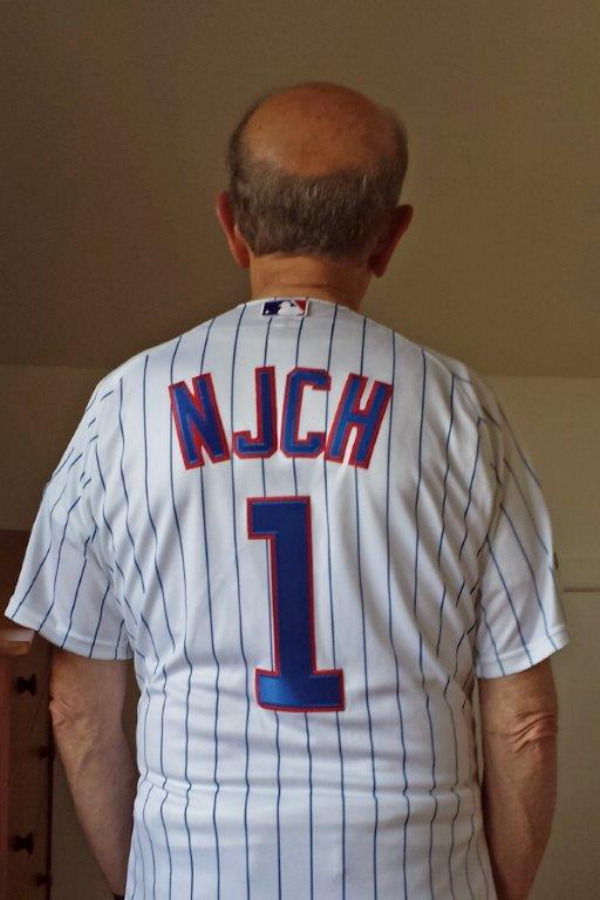By Pam Hersh
Dr. Stanley Katz, a longtime member of Princeton University’s faculty and director of the university’s Center for Arts and Cultural Policy, recently retired from the board of the New Jersey Council for the Humanities after 25 years of service. In keeping with the NJCH mission of “developing, supporting, and promoting projects that explore and interpret the human experience…” his colleagues on the board presented him with a most appropriate retirement gift: a Chicago Cubs jersey.
Professor Katz is renowned for exploring and interpreting the human experience — including his own experience of undying loyalty to the Chicago Cubs in the face of profound disappointment. The Cubs have not won a World Series in 107 years and were swept by the Mets in this year’s National League Championship Series, so Stan’s experience of loyalty to the internationally renowned loveable losers continues.
When the Cubs won back-to-back World Series championships in 1907 and 1908, Stan was not around to cheer them to victory. However, he was around in 1945 for a Cubs World Series game that they won. The Cubs ultimately lost the 1945 World Series to the Tigers in seven games, paving the way for the team to win the “award” the longest championship drought of any major North American professional sports team.
I have no concrete evidence for this next assertion, but I would bet that Stan Katz is the only Princeton resident who was present at a Cubs World Series-winning game. Born in 1934 on the north side of Chicago, a few blocks from Wrigley Field, Stan had a blood type, like most of the kids in the neighborhood, that was CC positive. His father took 8-year-old Stan to his first game at Wrigley Field, Aug. 22, 1942, and thus launched his Cubs Loyalty Project, which has inspired his friends and colleagues for decades.
The supernatural devotion was evident at that 1942 game, most of which Stan experienced in appropriately superhero turf — a telephone booth. Young Stan had a broken arm accompanied by the heavy plaster cast, which his father feared would “melt” if it got wet. A rainstorm forced his father to make Stan wait out the storm in a phone booth, and miss the Cubs making a triple play.
Over the years, as he physically moved further and further from Wrigley Field (receiving his M.A. and Ph.D. from Harvard and moving to Princeton in 1978), he never moved emotionally from Chicago and the Cubbies. His loyalty even inspired his friend’s daughter to write her college admissions essay on Stan and how he “influenced her life by being such a loyal Cubs fan,” said Stan.
His passionate loyalty also is evident in his support of Princeton University’s athletic teams, although his ties to these teams are decades shorter than his unbreakable connection to the Cubs. In recognition of his enthusiastic interest in Princeton University sports, Princeton University just engaged Stan as an Academic-Athletic Fellow. These fellows comprise a group of faculty and staff who are committed to strengthening and advancing the student-athlete ideal while reinforcing the educational mission of the university. They act as resources for the student-athletes, coaches, academic administrators and faculty. Stan is “attached” to Princeton University’s football quarterbacks — “they all are 6-3, 225 pounds — in perfect shape. I certainly do not share their physical characteristics, but I have a great time connecting with them,” he said.
During the past week as Stan watched the disintegration of the Cubs World Series hopes, the Princeton University quarterbacks undoubtedly were a source of comfort to Stan, as I tried to be when I ran into him on campus. My son Matt, a rabid Mets fan, scorned my “poor Stan” sentiment. He attributed my willingness to support a Cubs fan to the fact that I am a lifelong fan of the New York Yankees, who are hated as passionately as the Cubs are loved. Matt reasoned that the Mets did the Cubs fan a favor, because Cubs fans would lose their “loveable loser” niche in the world if the Cubs ever actually won.
Stan, acknowledged that the Cubs have fans all over the world because of their legacy of losing. “It is not regional with the Cubs, their appeal is international. We are known for our loyalty and patience — and our ability to wait until next year… I am willing to lose that loveable loser fame to experience emotion of seeing the Cubs as World Champions,” he said.
Plus it would be good for him academically to explore and interpret a human experience that is new to Stan — being a fan of a team that actually wins a World Series.

